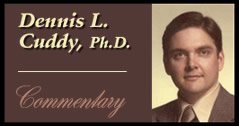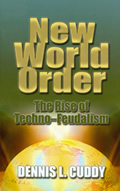LINCOLN
PART 2
By
Dennis L. Cuddy, Ph.D.
February 18, 2013
NewsWithViews.com
[On FoxNewsSunday (February 3), host Chris Wallace discussed the topic of illegal immigration, and the question I wanted to ask was "If we are supposed to ignore the fact that these immigrants have broken the law and are here illegally, then since we're a nation of equal justice under the law, what law do the rest of us get to break/ignore---murder, theft, or what?" Wallace also asked pointedly why limitations couldn't be placed upon guns, and on the same day, ABC's "This Week" also addressed the issue of gun control. Proponents of gun control argue that most people don't need "assault weapons" or clips of more than 10 rounds. However, the Second Amendment to the Constitution like the First Amendment applies to every individual and not simply to "most." "Most" individuals don't have to worry aboput freedom of speech, and "most" newspapers and members of the media don't have to worry about freedom of the press. However, that doesn't mean the government can prohibit those rights for certain individuals or members of the press and media. Just because "most" people don't need guns or clips of more than 10 rounds doesn't mean the government should be able to ban these for everyone. How is a man in the high crime neighborhood supposed to defend himself and his family from a gang breaking into his house and intent upon robbing and killing him and his family?
On ABC's "This Week" (February 3), Sen. Harry Reid and panel members also said regarding gun violence that they would look at the issue of mental health. While at first this might seem appropriate, remember that this could culminate in disallowing social conservatives the right to bear arms! As B. K. Eakman wrote in "What? Are you crazy? The Screening of America" (CHRONICLES, October 2004): "In August 2003, the National Institute of Mental Health and National Science Foundation announced the results of their $1.2 million taxpayer-funded study. It stated, essentially, that traditionalists are mentally disturbed. Scholars from the University of Maryland, California at Berkeley, and Stanford had determined that social conservatives, in particular, suffer from mental rigidity, 'dogmatism,' and 'uncertainty avoidance,' together with associated indicators of mental illness."]
To prosecute the Civil War, President Lincoln went for loans to the major bankers of the northeast, who wanted over 30% interest in order to get the U.S. into great debt and thus bring the country under the control of the Power Elite (PE). Lincoln would have none of it, and issued Greenbacks instead, which infuriated the PE. The National Bank Act of 1863 was the next measure of confrontation, and District of Columbia Court Associate Justice T. Alan Goldsborough in a February 11, 1947 address to the D.C. Bar Association referred to German Chancellor Otto von Bismarck in 1876 confirming the plot to divide the U.S. when discussing the 1863 Act. Goldsborough said Bismarck stated that "the division of the United States into two federations of equal force was decided long before the Civil War by the high financial powers of Europe. These bankers were afraid that the United States, if they remained in one block and were to develop as one nation, would attain economic and finanacial independence which would upset their (the bankers) domination over the world."
From the "Confederate" perspective, their name was taken from the states' original Articles of Confederation. The subsequent Constitution was originally rejected by the American people until the Bill of Rights (the first 10 amendments to the Constitution) were added, including Amendment 10 providing for "states' rights." In the decades before the Civil War, these states' rights were gradually eroded, giving more and more power to the federal government. The South's response was the Doctrine of Nullification (which followed from South Carolina's 1832 Ordinance of Nullification declaring certain Acts of Congress null and void and not binding upon the state), which was rejected by the majorty in Congress. This was considered by the South as "the tyranny of the majority, about which the founding fathers had warned, and the South therefore seceded from the Union in 1861.
In a letter, Lincoln actually expressed some sympathy for the South's position, but he felt secession was not provided for in the Constitution and that his oath of office required him to defend the Union. Thus, the Civil War was engaged.
Though Lincoln said he was defending the Constitution, he was actgually trampling it under foot. The guaranteed freedoms under the Constution were especially important to preserve during times of crisis. However, during the Civil War, Lincoln suspended the 6th Amendment's habeus corpus and jailed dozens of newspaper editors who disagreed with him on the issue ofr thewar. He also had an arrest warrant issued for U.S. Supreme Court Chief Justice Roger Taney for the same reason---so much for freedom of the press, freedom of speech, and Constitutional separation of powers between the executive and judicial branches of the federal government!
Unfortunately, Lincoln adopted the Machiavellian principle of "the ends justify the means," using unconstitutional means for what he believed was a worthwhile cause---preserving the Union. Lincoln was not vengeful toward the South, but planned a conciliatory Reconstruction wheereby Southern states would quickly be brought back into full Union membership.
This, the PE didn't like, and Lincoln knew it. In a November 21, 1864 letter (less than 5 months before he was assassinated) to William Elkin, Lincoln wrote that "the money power of the country will endeavor to prolong its reign by working upon ther prejudices of the people until all wealth is aggregated in a few hands, and the Republic is destroyed. I feel at this moment more anxiety for the safety of my country than ever before, even in the midst of war." Lincoln's private secretary, John Nicolay, challenged the authenticty of this letter (calling it as "bold, unflushing forgery"), saying it didn't represent Lincoln's opinion of the bankers. However, given Lincoln's experience trying to obtain loans from these same individuals at the beginning of the Civil War, one might question his secretary's assertion that the letter is fraudulent.
| Subscribe to the NewsWithViews Daily News Alerts! |
We do know that not long after the Civil War, a young Cecil Rhodes heard a lecture by John Ruskin at Oxford University and adopted Ruskin's elitist philosophy. Rhodes became a member of the PE and formed the secret Society of the Elect "to take the governmentof the whole world." According to Rhodes in an 1890 letter to his close friend William Stead, his secret society would be "gradually absorbing the wealth of the world," similar to Lincoln's fear about "all wealth aggregated in a few hands, and the Republic is destroyed" remark.
Today our Republic is being destroyed, as the PE is moving us toward its ultimate goal of a World Socialist Government.
� 2013 Dennis Cuddy - All Rights Reserved










 Share
This Article
Share
This Article






